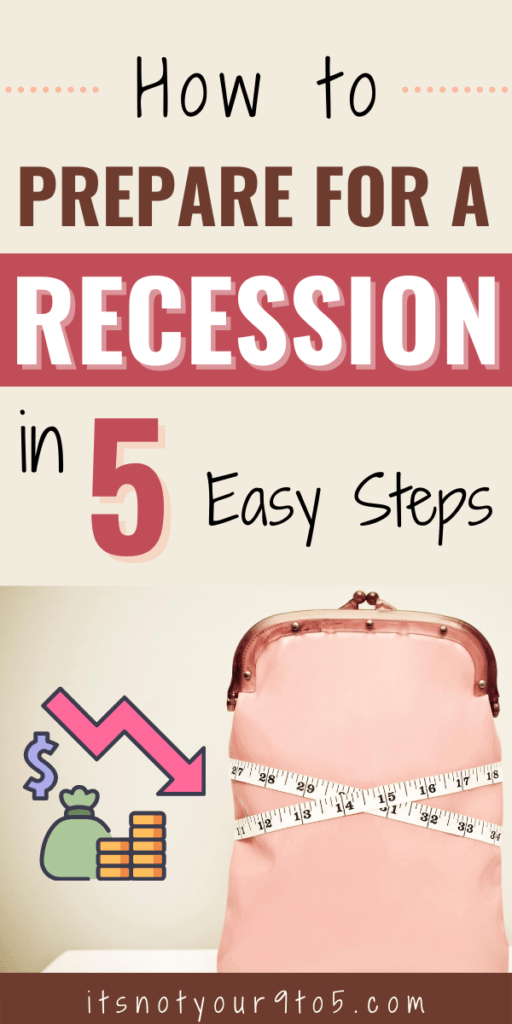Wondering how to prepare financially for a recession?
Hopefully as we come through this pandemic, we now face our next challenges as parents, guardians, spouses – RECESSION!
After COVID-19 touched every corner of the world, many countries are declaring a recession.
With no exceptions, the UK is officially in recession for the first time in 11 years.
But what does the recession mean to you and your family? What can you do about it? Specifically, how do you prepare your finances for a recession?
In this post, I will be answering these questions, and sharing with you 5 actionable steps to prepare financially for a recession (or even during the recession) for you and your family.
Remember, opportunities are only for people who are prepared. So having a game plan is the key to weathering the storm.
What is a Recession?
In simple terms, a recession is when economic activities decline drastically within a short period of time and last for more than a few months. This is typically measured by GDP (Gross Domestic Product). When GDP falls two quarters in a row, it is officially considered a recession.
How Could a Recession Affect You and Your Family?
Being in a recession can impact you and your family in a few different ways.
Job losses – As companies file for bankruptcy or cut down spending, this all boils down to an increase in unemployment. Sorry if you have already experienced it.
Credit crunch – meaning it’s harder to borrow money from the bank. If you are considering to purchase a house for the first time, you may struggle to get a mortgage.
Negative interest rate – with current rates being so low, if the recession hits hard and for a long time, this could drive negative interest rates, which means you actually have to pay the banks to keep your savings.
Prices may go up – As businesses reopen, to recover the money they lost from being shut and the additional cost of personal protective equipment to be put in place, you may see prices to go up in certain areas.
Tax rises – this is inevitable, but more so now than ever. Every country has had to prop up the economy, industry and jobs through the pandemic. All these costs will need to be recovered, and unfortunately, that will be through taxes.
Nobody knows exactly how all this is going to pan out and how long the recession might last. However, one thing you CAN do is to take control of your personal finances and make a plan for the recession.
Here are 5 actionable steps to prepare financially for a recession, for you and your family.
How to Prepare Your Finances for A Recession?
Step 1 – Save for an Emergency Fund
Having an emergency fund is always a good idea, but the need can be increased during a recession. If you find your financial means reduced either by a loss of business or your job you need your own money rather than turning to expensive loans.
Depending on where you live, the amount in your fund could be different, in the US it’s recommended you have 3-6 months of your pay.
In the UK, this could be less, if you are eligible for redundancy pay. To qualify, you need to be employed for more than 2 years, to receive statutory redundancy pay. You can find a calculator on the HMRC website that also explains your rights.
In addition, some companies often top this up depending on your years of service. This isn’t always the case, and only generally from larger corporations.
With this in mind, generally, 1-3 months of your pay should give you a good buffer should your income be impacted.
Step 2 – Minimise Your Debt
The second step to prepare financially for a recession is to minimise your debt. While it is always a good practice when it comes to family finances, minimising your debt becomes essential in times of recession if your income is reduced or disappears.
The main debt for most people is the mortgage, so make sure you stay on top of your options, depending on your circumstances. Overpaying will save you money in the long term, but might not be possible in a recession. Instead, you may need to increase the term (length) of your mortgage or switch to an interest-only. Both reduce your monthly payments.
Loans and credit cards normally follow from the mortgage. Aim to pay off the highest interest rate debt first, normally credit cards.
The key here is, reducing your debts, means you can control where your money goes if things get tight, instead of it disappearing on paying debts off.
Step 3 – Budget to Live Below Your Means
How well do you know where your hard earned money goes?
Understand what comes in and what goes out, what’s fixed and what’s variable, will help you to take control of your overall finances.
An easy way to find out whether you live below your means, is to see if your bank account grows or always reduces.
If it’s later, you may be spending at or above your means.
…Which is why you need a monthly budget, so you can live below your means.
Living within your means is when your total monthly spend is lower than your monthly income.
To create your monthly budget, list out all your expenses and put them into 3 categories:
- Essential – household bills such as mortgages, tax (council etc), debts, food, utilities…
- Important (but not quite essential) – clothing, TV & Broadband, gifts, kids extra-curriculum lessons like swimming, dancing etc.
- Nice to have (things you COULD live without) – streaming services, gym memberships, wine or cheese subscriptions, trips to the coffee shop, eating out etc.
This essentially gives you a plan of what expenses you can cut if times get hard. Starting with your nice to have a list, and then moving to your Important list. When you get to the essential list, look at your mortgage options mentioned in Step 2.
More ideas to save money for your family:
Step 4 – Diversify Your Income Sources
As the cost of living increases and the day jobs become increasingly insecure, people around the world are no longer putting all eggs in one basket. Instead, they are looking for other ways of bringing income.
Do you know, 40% of workers in the UK and a rising 50% of workers in the US reported to have a “side hustle”.
The best part is, thanks to the internet, there are so many ways you can make money from home doing things you love.
This is the platform that fast-tracked my passive income journey as a blogger and I am sharing with you in this FREE 7 day blueprint ?.
Step 5 – Investments
This last step to prepare financially for a recession is mostly for those of you who have put away some emergency investment money aside.
Investments are a really interesting topic, as in a recession, they can be viewed both positively or negatively.
Why negatively?
If you are relying on returns (dividends) or cashing out closer to retirement, a recession can be terrible news, wiping thousands off your investments. The best advice here is to ensure your investments are made across a variety of sectors or industries. This reduces the risk of all investments heading south at the same time.
Let’s take a look at the bright side.
As the market tanks, it can be a good time to invest. These investments are likely to be mid to long term (3-5 year) investments, as you will need to wait for the market to recover. Try to consider companies who have lots of cash or access to cash to weather the storm.
Depending on how you invest, it’s a good idea to talk to your investment manager, portfolio manager or a financial professional to help you develop a plan for this, linked to your circumstances and approach to risk.
Final Thoughts on 5 Steps to Prepare Financially for a Recession
An economic recession can have a huge impact on you and your family. Being prepared is the key to weathering the storm.
I hope these 5 actionable steps help you to prepare financially for a recession. With these strategies, you may even be able to take advantage and make money from it.
Want save money and time while eating healthy? Get your FREE weekly menu planner & grocery list here:
5 Steps to Prepare Financially for a Recession [Pin it later…]

![You are currently viewing 5 Steps to Prepare Financially for A Recession [for Your Family]](https://itsnotyour9to5.com/wp-content/uploads/2020/08/How-to-prepare-financially-for-a-recession_-FB.png)




A great read!
Unfortunately, I think this current situation has forced many people to reconsider their financial state. I know that many families are struggling with the loss of jobs, hours cut back, businesses closed, etc. It’s a difficult time and people are trying to find a way to find their footing once again. While it may be a challenge now, this is a great opportunity to restructure our financial focus, preparing ourselves to never have to battle back in this way again.
Couldn’t agree more. These 5 steps will recession proof your finances for now and the future. Well said.
Hey there!
That guide is really amazing. No dobts, recession periods are always tough, usually from financial backlashes. The stated steps are indeed eye openers to open’s ones mind as to ways to financially prepare for recessions. This will surely help a lot of famillies to survive future recessions very well.
Thanks.
I’m pleased that you found it helpful. It’s so true that being prepared is the best way to get through any financial crisis.
wow! I like how you explained recession thoroughly! I find this super helpful!
Thanks, I am pleased to hear that this was helpful to you.
Great tips thank you! I wasn’t aware of “negative interest rates”. Fortunately I do have an emergency fund. I live in Hawaii and we rely almost entirely on tourism for our income. My partner and I have both been out of work since March. We also saw the shipping companies that bring our vital supplies increase rates by 46% this month… Ouch.
I’m so sorry that the crisis magnified in where you live. Sounds like you already have a great start by having an emergency fund. Hope some other tips help you and your family survive this unprecedented recession. All the best!
This is a great post, right on point! Emergency fund outside of your savings is a great idea. I am going to plan and work on it. Thank you for sharing!
Thank you. Glad you found it helpful. I do believe having a plan is the best way to get through the recession financially.